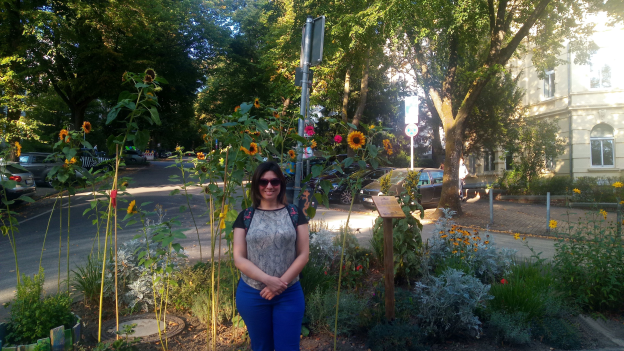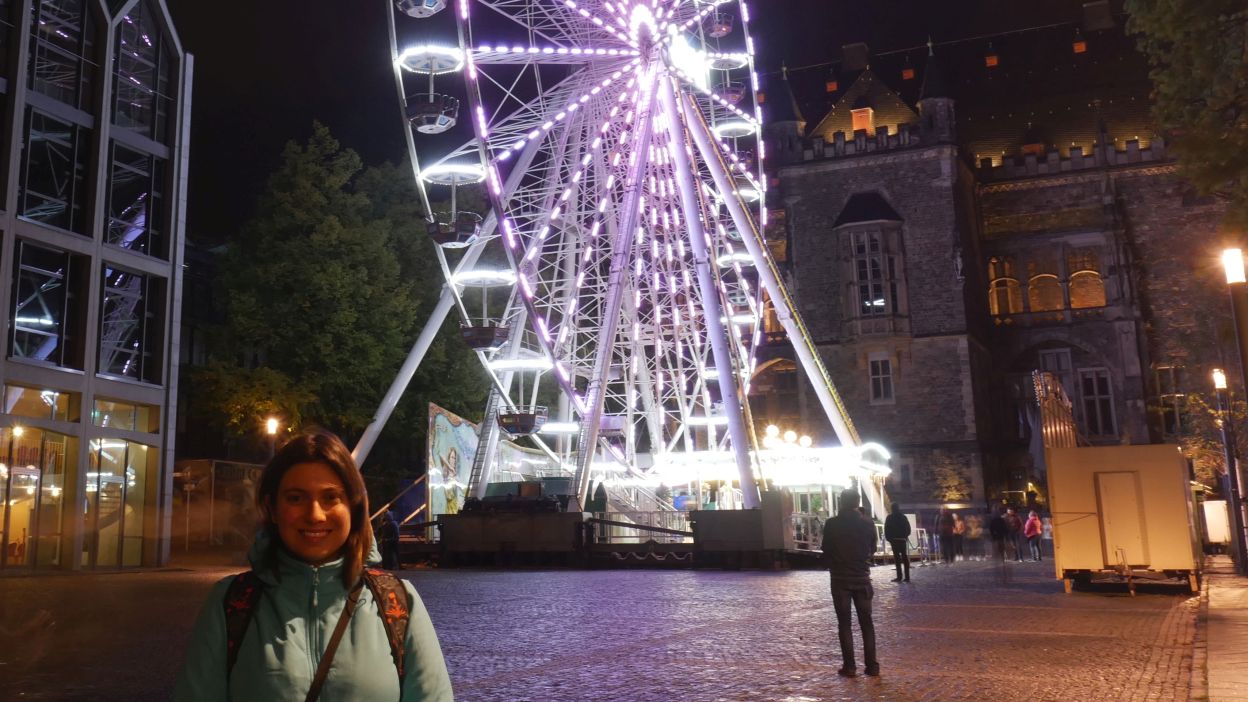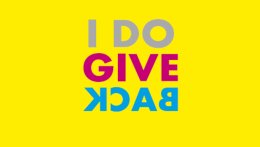María Florencia Blasina Italiano
 Privat
Privat
María Italiano spent a research stay in Aachen
"I consider I had a very interesting life experience. Once more, I heartly thank for the opportunity I was given, which very much enriched me both academically and as a person."
María Florencia Blasina Italiano is a PhD student from Uruguay. Thanks to the DAAD-Stiftung's Stephan Scholarship, she was able to come to Germany to do conduct research.
In the following, she reports on the highs and lows she experienced during her stay:
First, I sincerely thank the DAAD-Stiftung (DASt) for giving me, with the Stephan Scholarship, the chance for such an interesting experience. It was really illustrative, both academically and for life.
The timing (01.09.2020 to 31.01.2021) was not the best to profit from all the possibilities of such an opportunity. It was difficult to make connections in the pandemic situation, even with my coworkers, because there were very few instances to get to know those I was not directly working with. I got to know at best Luis, the researcher I was working directly with. I also got to know Shima, the group administrator and Dmitry, Alexander, Arved, Nadhir, Hakon and Sebastian, other members of the group. Nevertheless, with most of them I only got to share a couple of lunches and some meetings at the coffee machine: interaction was mostly discouraged due to pandemic situation.
It was even harder to get to know other people from the university. I intended to join a university club, but of course it was impossible. Nevertheless, I think the welcome centre at RWTH Aachen made a great job hosting virtual meetings, sometimes in German and sometimes in English, giving foreign students and researchers a place to get to know new people for talking; they proposed a topic for making casual conversations more interesting. The participation at the meetings varied from five to fifteen people. I think that action helped a lot during the partial-lockdown period.
In this sense, I also regret not having been able to meet any people from the DAAD-Foundation, which I understood I would have done in a regular situation, for instance my sponsor, anyone from the organization or other sponsored students or researchers. I am fortunate that my husband travelled with me at his own expense, therefore he was with me during the partial-lockdown situation, which I think would have been much harder to overcome if I were alone.
My husband was taking a course and doing an internship for his Master studies; he also had to perform most of his activities from home. Though he had a couple of young partners at the course, they had no mood to meet in person, due to pandemic. My husband didn’t find appalling to participate in virtual meetings, so he didn’t join. The only non-virtual meeting we were invited to was a photographic city tour, organized by the city of Aachen. That was a very enjoyable activity, we both took part in and at which we got in contact with some international as well as German students and researchers.
Regarding my academic activities, I think I was able to learn very much although the situation was complicated. Many people from the group were in home-office and the interaction and advance in projects is definitively not the same than when in regular office. I attended the office every day until the middle of October, when everybody was told to try to avoid going. Then, I started attending some days and doing home-office the rest of the week. At the beginning of December, we were all told to avoid going to the office at all, so I started permanent home-office.
It was very difficult for me since of course the apartment I rented wasn’t prepared for that. I knew there could be a chance to have to home-office for some period, but it was impossible to me to afford an apartment suited for that, with an adequate desktop to work, with an ergonomic chair, which I find very important since I suffer from back pain. The only table I had was a dinner table, smaller than a regular desktop, which of course I also used for meals. Finally, I didn’t have an external computer monitor, which was a big problem at first, because my laptop’s monitor had broken at the flight. I bought a new laptop, but a big external monitor is nevertheless more comfortable.
Additionally, I find much easier to organize myself when I am in a work environment which is different than my home environment. I was also all the time feeling I was missing the chance to bond with the group. I nevertheless understand the sanitary prioritization.
Among my activities, I studied the book “All of Statistics”, L. Wasserman, doing several exercises which were selected and corrected by Professor Marco Scavino. Then I started working guided by Professor Luis Espath. I learnt Experimental Design from the book “Data Analysis”, D. Sivia. I studied Optimal Experimental Bayesian Design from the PhD thesis “Bayesian optimization of experiments using stochastic gradient methods”, A. Carlon. I also learnt Finite Elements from the book “The Finite Element Method”, T. Hughes. Then, I analyzed and understood the scripts Luis gave me, regarding Bayesian optimal experimental design (BOED).
I elaborated a script for simulation regarding my particular problem of interest, the deformation of a plate in a short time window after being hit by a hailstone which has reached terminal velocity. For doing so, I learnt how to use the open-source Fenics computing platform with Python. The script I developed parted from a creative-commons script that performs the time integration of transient elastodynamics using the generalized alpha method. As a final part of the work, I joined together my simulations with the BOED scripts. We continue collaborating in order to achieve results of interest.
I think there wasn’t any chance for me to do my internship and avoid the lockdown which occurred in the worst part of the pandemic, so my experience got as good as possible. Firstly, I was told by the DAAD-Stiftung that I had to finish my internship before January 31st, 2021. Secondly, if going later I would have had to adapt my activities, which were meant for and early stage of my Ph.D. investigation, to a later stage if it.
I also had the intention to practice my German, which I somehow did, but just superficially. I expected to improve my abilities compared to those I had when I was studying German in high school, but I think I barely recovered the ones I had. Nonetheless, that’s something, for I didn’t have the chance to practice it in a long time before. When I first thought of doing this internship, I mainly intended to join university activities such as sports or arts, at which I could interact with native German speakers on daily situations, but of course none were offered.
Also, only three of the people at the group I worked with did speak German fluently, being only two of them native speakers. The official language at the group was English, since speaking German always left someone out of the conversation.
Regarding German language courses, I wasn’t interested in them myself, since they were expensive and I already had had several years of them at school: what I expected was the unique experience of being immerse in a society that speaks a certain language, but due to the pandemic, all people were very distant. Nevertheless, my partner looked for a course to learn German from scratch, but all of them were virtual. He was discouraged to join one given a combination that they were virtual, expensive, they started much after our arrival and didn’t seem well planned for virtuality.
I also had a problem with the visa. Uruguayans have a 90-day tourist visa for Europe. I asked at the German consulate how it worked for the period after the student visa I was provided, they informed me it naturally extended. I was very specific in the question, explaining that I intended to travel within Germany after my internship. Fortunately, due to covid I stayed only for 3 days (in order to close up my life in Aachen). I was then stopped at the airport by the police when leaving, because my student visa had expired. They explained me that the tourist visa only activated if I left the Schengen zone and re-entered. I am absolutely sure the people at the consulate didn’t mention it, but sadly, I asked that in person, so I don’t have any record that might work as a proof. When I wrote to them after the incident, they told me they wouldn’t take any responsibility for any given information and that anything that they informed regarding German regulation wasn’t of any warranty, which shocked me. They also argued that the problem with the visa was covid-19 related, which after talking to the police and researching for information, I understand was not.

Privat
In its ups and downs, María Italiano's stay in Germany was comparable to a Ferris wheel
As an Uruguayan I found some very interesting everyday experiences, for comparing lifestyle in one country and another. I will refer to those that are probably non-covid-19 related. To be fair, I will refer both to things that are better and worse than in Uruguay.
I think the living cost in Germany is much higher to the living cost in Uruguay. I rented an apartment which was, regarding location and comfort, worse than the one I rent in Uruguay and it costed 4 times the one I rent in Uruguay. The internet costed 2 times what it costs in Uruguay, with a worse connectivity. I paid 8 times more for electricity in Germany than in Uruguay. Regarding groceries, the price span in Germany is wider than in Uruguay, therefore the groceries for one month might cost less in Germany, if restricted to very basic consumption. As an exception, meat costs much more than in Uruguay, but I prefer to eat less meat and was amazed by the vegetarian alternatives that can be found in Germany. Regarding food, I was amazed by the variety of great cheese at a good price. I also enjoyed fresh champignons, which I love and are far more affordable than in Uruguay.
I found Germany too much bureaucratic. It is not different than in Uruguay, but bureaucracy is one of the things that disgusts me the most of my homeland. I found out that every exchange student or foreign researcher that arrives in Germany faces a deadlock when trying to find housing and opening a bank account: one must have a registered address (Anmeldung) in order to open a bank account, one must have a bank account in order to have money, one must have a lot of money in order to pay not only the first month of housing but also the deposit in order to have the right paper with the address to register.
Airbnb housing is not accepted for this register, even when you could rent an Airbnb housing for months, which might be your whole staying time and the register at the city hall must be made up to two weeks after arrival. I was very lucky that the person renting me the apartment agreed to give me the required paper and the apartment keys before paying the deposit. I received the first scholarship payment a month after arriving, so I had to live withdrawing money from my account in Uruguay. I was also disappointed that people can only get by postal mail a lot of letters that in Uruguay I get by email. Therefore, since the mailboxes in my building where inside, and the postman/lady rang the bell of all apartments just to get in quickly, my bell rang several times per day.
In another aspect of daily life, I found Germany much better prepared for riding a bike, which I did most of the time. I bought a second-hand bike as soon as I could and sold it before my return. Not only the roads and street signals are much better in this sense, there is also very easy to find a place to tie the bike everywhere. In Montevideo, where I live, there are just starting to appear bike roads, being still insufficient. There is also a big probability for the bike to be stolen if tying it in a public place. Nevertheless, a big incentive to use the bike is that public transport is much more expensive than in Montevideo, especially considering the size of Aachen.
A fantastic aspect of Germany is the existence of beautiful parks everywhere. Visiting parks was a great activity, and fortunately still allowed even in partial lockdown. Visiting those parks is indeed a lovely memory of my stay in Germany that I took back to Uruguay. Most of the experiences that I will fondly treasure forever are associated to beautiful green areas or some cultural antique sites such as the Rathaus.
Regarding the way of working, the main difference I found is that the German group is more eager to publish their research in the form of papers. This is somehow slower in Uruguay. I think German groups are more focused, which I find very positive.
Regarding my future, I am currently glad working in my university in Uruguay. I think the experience of researching in Germany was very interesting and I would gladly continue to work from abroad with the group, but I want to finish my PhD in Uruguay, as planned. I made three important professional contacts, with which I hope to continue a professional relationship of cooperation and two friends with which I hope to continue a friendship relation.
In conclusion, I consider I had a very interesting life experience. I understand the DAAD-Stiftung made its best to offer me a great opportunity and the problems that appeared were out of its power. Once more, I heartly thank for the opportunity I was given, which very much enriched me both academically and as a person.
As of January 2021.


